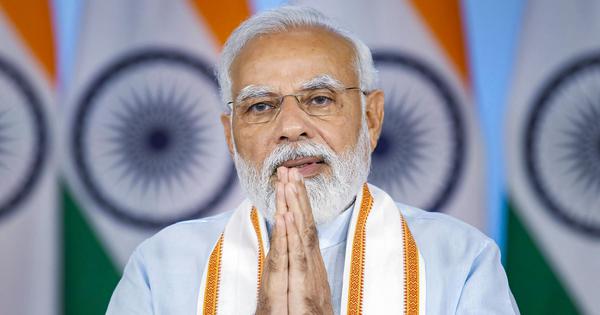The Narendra Modi-led government has faced criticism for making several policy “U-turns,” and this trend appears to be continuing. In the two months since PM Modi took office for a record third term, the government has reversed at least four significant policy decisions. The most recent U-turn involves the withdrawal of the advertisement for lateral entry bureaucracy jobs. While the Opposition has claimed this as a “victory,” a key detail being overlooked is the BJP’s growing responsiveness to its allies’ demands.
These U-turns reflect a government more aligned with the NDA coalition than a purely BJP-led administration. The Congress, however, has seized the opportunity to spotlight its “victories” over what it describes as a “weak PM.” Congress leader Manickam Tagore told ETV Bharat that the decision to revoke the UPSC advertisement on lateral entry jobs highlights that “we now have a weak Prime Minister,” positioning Rahul Gandhi as a strong Leader of the Opposition.
UPSC Scraps Lateral Entry Jobs Advertisement
The latest in a series of policy reversals by the NDA government is the cancellation of the Union Public Service Commission (UPSC) advertisement for lateral entry into government jobs. Union Minister Jitender Singh stated that the lateral entry process should be “aligned with social justice.” However, the decision to scrap the advertisement appears to be a response to demands from the BJP’s allies.
The lateral entry scheme, which aimed to fill key senior- and mid-level positions in ministries, did not include quotas for SC, ST, and OBC candidates, as recruitment was to be based solely on merit. The scheme, challenged by the Opposition, also faced opposition from key BJP allies in Bihar, including Chirag Paswan’s LJP and Nitish Kumar’s JD-U.
Chirag Paswan expressed his party’s opposition to the scheme, while JD-U leader KC Tyagi warned that the lack of reservations in lateral entry could position Rahul Gandhi as a champion of backward classes. After the advertisement was withdrawn, Chirag Paswan expressed satisfaction, stating, “I am happy that Prime Minister Narendra Modi understood the concerns of a large section of society — people from Scheduled Castes, Scheduled Tribes, and Backward Classes.”
‘Reconsideration’ of Broadcasting Bill Draft
Another recent U-turn by the Modi government concerns the Broadcasting Services (Regulation) Bill, 2024. The Bill, which was intended to replace the Cable Television Networks (Regulation) Act, 1995, was withdrawn as the government opted to “hold discussions with stakeholders on the draft Bill.” This move followed allegations of a “secret second draft” being circulated.
The Bill was reportedly designed to regulate content created by independent news outlets. In response to the backlash, the Ministry of Information and Broadcasting clarified on X (formerly Twitter) that they were engaging in consultations with stakeholders on the draft bill. The clarification followed accusations from the Opposition that the government was “suppressing the truth” and favoring business interests. Trinamool Congress Rajya Sabha MP and former Prasar Bharti CEO Jawhar Sircar accused the government of secretly circulating the Bill and avoiding accountability.
Waqf Bill Sent to Joint Parliamentary Committee
In another move seemingly influenced by its allies, the government, despite having majority support, decided to send the Waqf (Amendment) Bill to a Joint Parliamentary Committee (JPC) for review. The Bill, which sought to introduce significant changes to the Waqf Act of 1995, faced opposition from BJP allies like the LJP, JD-U, and the Chandrababu Naidu-led TDP. Additionally, various Muslim organizations opposed the Bill.
Key changes proposed in the Bill include the inclusion of at least two non-Muslim individuals and two women on the Central Waqf Council and the requirement for a person to be a practising Muslim for five years before transferring their property as Waqf. The Bill also aimed to address issues related to Waqf boards arbitrarily taking over properties. Although the TDP and JD-U initially supported the Bill, they later opposed it after Minority Affairs Minister Kiren Rijiju introduced it in Parliament on August 8. Following the opposition from its key allies, the BJP-led government decided to refer the Bill to a JPC for further examination.
Rolling Back Removal of Indexation Benefits on Property Sales
Another significant policy reversal by the Modi 3.0 government was the rollback of the proposed removal of tax benefits on Long Term Capital Gains (LTCG) from property sales. In response to concerns over a Budget proposal to eliminate indexation benefits on LTCG, the government revised its stance on August 6.
Taxpayers can now choose between paying a 20% LTCG tax with indexation for property purchased before July 23, 2024, or a 12.5% tax without indexation. The amendment, viewed as a major rollback, allows for the lower tax amount to be paid under either option. However, for properties bought after July 23, 2024, only the 12.5% tax without indexation applies. The indexation benefit remains available only for immovable property.
NDA allies had also raised concerns about this proposal, with Chandrababu Naidu’s TDP advocating for “protection for the middle class, which invests heavily in real estate.” According to an Economic Times report, TDP MP Srikrishna Devarayalu sought a reconsideration of indexation and a rollback of GST on health and life insurance.
Learning from Past Mistakes
The BJP’s recent policy reversals may reflect lessons learned from its handling of the now-scrapped farm laws. The BJP faced widespread protests and was ultimately forced to withdraw the contentious laws, which led to the loss of its oldest ally, the Shiromani Akali Dal. The Akali Dal broke ties with the BJP to support the protesting farmers, most of whom were from Punjab.
At that time, the BJP had 303 MPs in the Lok Sabha. Today, the party has 240 MPs, falling short of the majority needed to form a government on its own. This shift in numbers has made the BJP more reliant on its allies, including the TDP (16 MPs) and JD-U (12 MPs). As a result, the BJP appears to be making concessions to keep leaders like Chandrababu Naidu and Nitish Kumar on its side.

